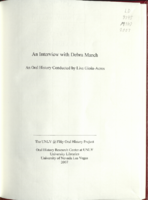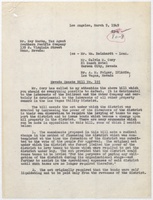Search the Special Collections and Archives Portal
Search Results

Transcript of interview with Debra March by Lisa Gioia-Acres, February 21, 2007
Date
Archival Collection
Description
Text

Letter from E. E. Bennett (Los Angeles) to Ray Marks (Reno) regarding Nevada Senate Bill 155, March 9, 1949
Date
Archival Collection
Description
Letter from Bennett calling attention to Nevada Senate Bill No. 155. Senate Bill 155 gives the Las Vegas Valley Water District power in levying taxes and issuing bonds in ways contrary to its original act. According to Bennett, it would create an unfair tax burden on the Los Angeles & Salt Lake Railroad Company and should be defeated. Senate Bill 155 is referenced below.
Text
Audio clip from interview with Lovee duBoef Arum by Barbara Tabach, November 1, 2016
Date
Archival Collection
Description
Part of an interview with Lovee duBoef Arum on November 1, 2016. In this clip, Arum discusses her childhood, family life, and what brought her to Las Vegas.
Sound
Audio clip from interview with Arne Rosencrantz by Barbara Tabach, February 18, 2015
Date
Archival Collection
Description
Part of an interview with Arne Rosencrantz on February 18, 2015. In this clip, Rosencrantz discusses his family heritage, childhood, and living in Las Vegas.
Sound

Photograph of the Flamingo Hotel gaming room entrance, Las Vegas, circa late 1940s-early 1950s
Date
Description
Image
Circus Circus Enterprises Scrapbook
Identifier
Abstract
The Circus Circus Enterprises Scrapbook consists of articles from 1984 related to the Circus Circus Las Vegas Hotel and their investment properties. The scrapbook includes articles on the entertainment, dining, real estate, and management of Circus Circus Enterprises in Southern Nevada.
Archival Collection
Alan Paine Papers
Identifier
Abstract
The Alan Paine Papers are largely comprised of the works written by poet and screenwriter Alan Paine, including his screenplays, a manuscript for an unpublished book, and
Archival Collection
Las Vegas Astronomical Society Records
Identifier
Abstract
The Las Vegas Astronomical Society Records (1981-2003) focus on the early history of the Society. The collection contains membership information, descriptions of the organization's founding by both its first director and first president, a copy of the Society's newsletter from 2003, and color slides from 1981 and 1982 that document the Society's early activities.
Archival Collection
The Collection of Newspaper Clippings on Thomas Hanley
Identifier
Abstract
The Collection of Newspaper Clippings on Thomas Hanley is comprised of photocopied newspaper articles from the
Archival Collection
White Cross Drug Store Scrapbook
Identifier
Abstract
The White Cross Drug Store Scrapbook (1950-1964) contains photographs, employee training materials, newspaper clippings, advertisements, displays, and some historical narrative and press release material on the history and mission of the White Cross Drug Store. It also includes advertising ephemera and brochures on cosmetic products and perfumes of the early 1950s.
Archival Collection
